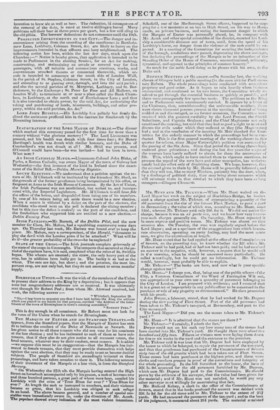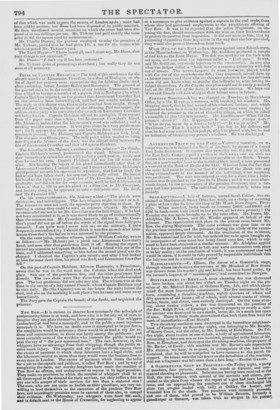mrt. HuNT AND MR. TICENER.—When Mr. Hunt waited on thLord
Mayor last week on the subject of Blackfriars Bridge, he insiuu ated a charge against Mr. Tickner, of appropriating a quantity of the old pavement from the site of the former Fleet Market, to pave a yard in Bermondsey ; the value of which was, according to Mr. Hunt, sonic 801., whereas Mr. Tickner paid only 30/. for it. We did not notice this charge, because it was an ex parte one, and we know how very inaccurate such charges generally are. On Saturday, Mr. Hunt repeated it in more express, mind positive terms. Mr. Tickner was absent on that
occasion also. On Tuesday, the case was regularly argued before the Lord Mayor ; and as a specimen of the exaggerations into which inaccurate observation, operating on party feeling, may lead the most acute men we give the examination at length. dr. Hunt stated that he had applied at the office of the Commissioeers
of Sewers, on the preceding day, to know whether the 32/. whic:i Mr. Tickner said he had paid, had or had not been paid ; and he had rect.: col an answer in the negative, with, however, a request that lie would call. in the morning, when he should be answered more particolarlv. Ile called ascordiugly, hut he could get no information. Mr. Tielmer would, however, most probably be able to explain.
Mr. Tickner—" The books are here, and now what is your specifie charge amtinst me ?" Mr. hunt—" I charge you, that, being one of the public officers ef the City, a Common Councilman of the Ward of Farringdon Wit out, you appropriated to your own use a quantity of pavement belonging to the City of London. Tam prepared with evidence; and I contend that it is a great act of impropriety in any public officer to he concerned in the purchase or sale of any property so circumstanced." He then proceeded with his proofs.
John Dwyer, a labourer, stated, that he had worked for Mr. Dupree during time new paving of Fleet Street. Part of the old pavement had. been taken to Mr. Tickner's tan-yard, at Bermondsey, and part to the City stone-yard. The Lord Mayor—" Did you sea the stones taken to Mr. Tickner's yard ? " Mr. Hunt—" It is admitted that the stones are there ? "
Mr. Tickner--“ Certainly, I admit the fact." Dwyer could not on his oath say how many tons of the stones had been carried into Mr. Tickner's yard. He thought there were about two hundred and fifty tons. Fifteen or sixteen men were laying them down for five or six weeks in the yard and the entrance to the premises. Mr. Tickner said it was true that Mr. Dupree had been employed by the house to which he belonged, to repair the pavement of the tan-yard, and that that gentleman had purchased of the Commissioners of Sewers sixty tons of the old granite which had been taken out of Fleet Street. Those stones had been purchased at the highest price, and there were clerks and vouchers present in proof of the correctiiess and integrity of the whole proceeding. In the bill furnished to the house, the ite:n of 321. 3s. 9d. appeared for the old pavement furnished by Mr. Dupree, which sum Mr. Dupree had paid to the Commissioners. He should prove by the evidence of his surveyor, that the value had been given for the material ; and if Mr. Hunt was not satisfied, he would pay any other surveyor most willingly for ascertaining that fact. Mr. Richard Kelsey, a clerk in the office of the Commissioners of • Sewers, stated that in the books produced the account was debited with 32/. 3s 9d. for the old stone sold to Mr. Tickner to the extent of 257 yards. He had measured the pavement of the tan-yard ; and to the best of his judgment, it measured about 251 yards. The material consisted
of that which was unfit tcspave the streets of London again ; none had been sold by auction, but ?ome had been disposed of by public contract. Be then mentioned several occasions on which the stone had been disposed of at ten shillings per ton. Mr. Tickner had paid exactly the same price 2s. 6d. the square yard by measurement.
Mr. Charles Dupree, the paviour emplOyed to relay the premises of Mr. Tickner, proved that he had given 10s. a ton for the stones with which he paved Mr. Tickner's yard. The Lord Mayor—" I have heard all, and I must say, Mr. Hunt, that your charge is not sustained."
Mr. hunt—" I don't say it lies been sustained."
Mr. Tickner spoke of proceedings elsewhere ; but really they do not seem at all necessary.
Tams OF CAPTAIN IIELS 31.—The trial of this gentleman for the alleged murder of Lieutenant Crowther, in a duel at Boulogne, on the 1st of April last year—a most appropriate de), for fighting duels—took place yesterday, before Justices Bailey and Bosanquet. The ground of the quarrel must be in the recollection of our readers. Lieutenant Crow ther wished to become a member of a pigeon club at Boulogne; to which Captain Helslitun objected, on the ground that Lieutenant Crowther had
on one occasion been horsewhipped, and had not sought satisfaction.
The reply to this charge was, that satisfaction had been sought, though not obtained, through the medium of the Mavning Post newspaper, the address of the party who committed the assault on Lieutenant Crowther
not being known. Captain Helsham offered to apologize, if an extract from the paper were shown him ; but Lieutenant Crowther's friend, Mr. Maloney, insisted that the Lieutenant's word was sufficient ; and a meeting was the consequence. It was gone about in a very public manner ; lir it appears that there were not less than from twenty to thirty spectators present. Mr. Maloney and Captain Helsham are both Irish. The distance was fifteen paces. The only point which tended to bring into dispute the fairness of the duel, was the alleged delay between the fire of Lieutenant Crowther and that of Captain Helsham.
The following is Mr. Maloney's evidence on this point :—" Mr. Grady, Captain Helsham's second, pronounced the signal. Lieutenant Crow titer immediately raised his arm with rather a quick motion, fired, and then lowered his arm. Captain Helsham did not fire till some time after. Not hearing the report of his pistol immediately after that of Lieutenant Crowther, I looked ebout, and I observed Captain Ifelsham's pistol pointed towards his opponent in a position, that had he tired, the ball would have fallen short, his arm not being fully raised. He leaned
his head to the right to get a good view t,f Mr. Crowther, raised his arm gradually, and did not tire for Some seconds, until he had fairly covered his man, that is, till he got his pistol in a direction to Mr. Crowther, and looking along it, he appeared to take a deliberate aim. He fired, and Mr. Crowther fell."
On his cross-examination, Mr. Maloney added—" The pistols were detonators, and hair-triggers. The hair-triggers might be used or not. The detonators were not used, the opposite party objecting to them. By moving a spring they could be used as common triggers. Mr. Grady recommended me not to let Mr. Crowther use the hair-trigger, if he had
not been accustomed to it, as it was more likely to go off unintentionally than the common one. Mr. Crowther, however, did use it. Mr. Crow ther's pistol did not go off before the words of the signal were fully pronounced. I am quite sure I never said so ; on the contrary, I have frequently contradicted it ; I should think it was five seconds after Lieutenant Crowther's fire before it was returned by the prisoner.
On the same point, another witness, named William Cooksby, swore as follows :—" Mr. Maloney put a pistol into Lieutenant Crowther's
band, and soon after that gentleman fired it off. Hearing the report I turned my attention to Captain Helsham. I had a friend with me at the time, and I addressed something to him before the second pistol was dis
charged. I observed the Captain's arm raised; and after I had looked at him for some short time, his pistol was fired, and Lieutenant Crowther
fell."
On the part of Captain Helsham, Alhonse Hanoupin, a Frenchman, swore that he was in the wood near the Column when the duel took place. Saw one of the gentlemen fire, and the other gentleman fired directly. The two shots were like those fired from a double-barrelled gun. The last gentleman did not take any aim. The witness was at the time in the service of a lady named French, whom Captain Helsham used to visit daily. He (the Captain) was at her house the night before the duel, and also on the morning it took place ; but he came and went away
The Jury gave the Captain the benefit of the doubt, and acquitted the prisoner.



























 Previous page
Previous page